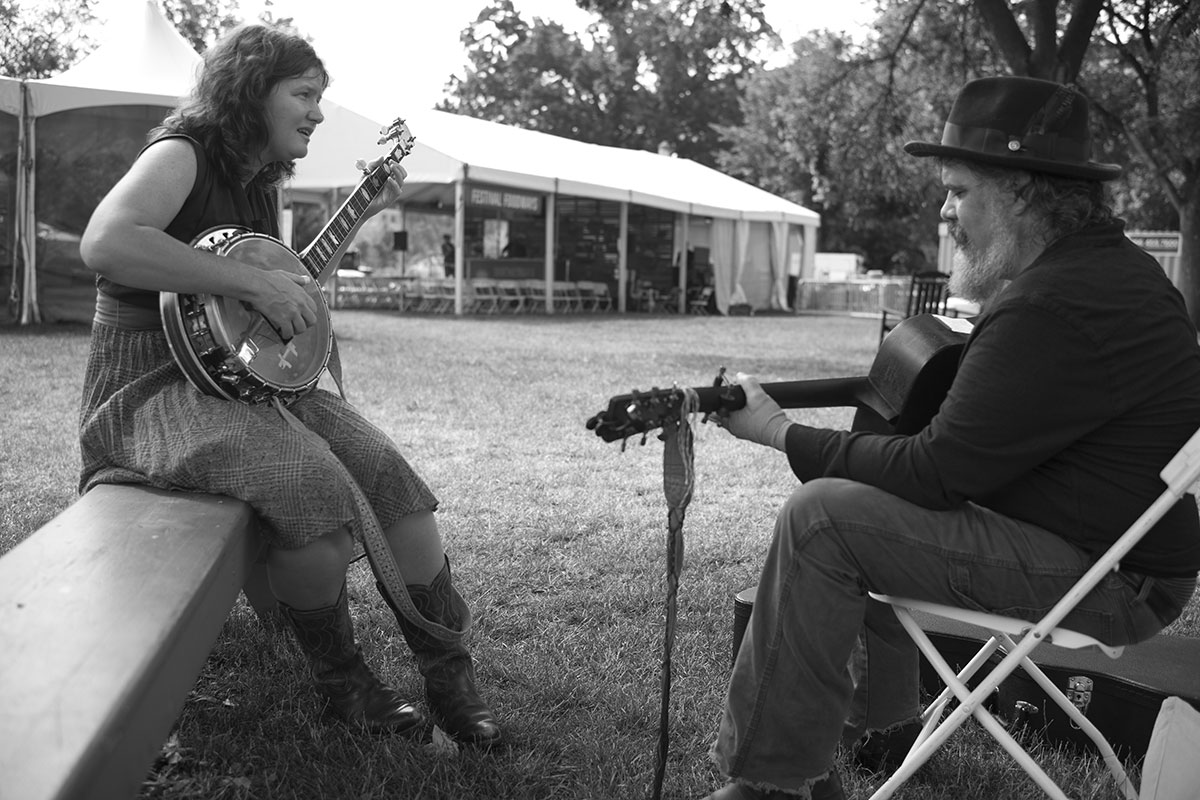The Creek Rocks Meld Past and Present with Ozarks Folk Tunes

Cindy Woolf and Mark Bilyeu squeeze in a rehearsal before the Festival grounds open.
Photo by Vivianne Peckham, Ralph Rinzler Folklife Archives
At the 2023 Smithsonian Folklife Festival, The Creek Rocks, composed of married duo Mark Bilyeu and Cindy Woolf, showed how they bring a modern twist to traditional folk music.
Taking Ozarks songs found in folk collections from across the region—“not necessarily played completely traditionally,” as Bilyeu says—The Creek Rocks find a way to connect modern audiences to the folk music of the past. For their first album, Wolf Hunter, The Creek Rocks drew from the collections of John Quincy Wolf of Batesville, Arkansas, and Max Hunter of Springfield, Missouri, as a way to commemorate their respective hometowns and the region’s musical legacy.
“We’re just some of those oddball people who, for whatever reason, enjoy digging into the past,” Bilyeu said. “It’s up to someone to take those materials and those collections and do something new with them, do something creative.”
“Also, they’re really cool songs,” Woolf added. “Yeah, it’s something we want to do—preserve the music, let people hear it who wouldn’t ordinarily—but also, we just like to.”
Looking into Ozarks history and music also helps Bilyeu feel connected to the region. “It tends to help me be rooted in the place where I come from,” he said. “It seems, as time goes by, the things that make different places distinct from one another is tending to slip away. And I think it just makes for a richer existence.”
Camera: Mykal Bailey, Sonia Harnish, Nadya Ellerhorst, Yijo Shen, London Pidel, David Barnes
Editing: Hayden Draycott
Their appreciation for their upbringings in the Ozarks is palpable, even in their band name. To deter the constant misspelling of their surnames, Bilyeu and Woolf decided they needed a band name. “The Creek Rocks” is an homage to a creek near Bilyeu’s father’s hometown and a nod to the popular Ozarker pastime: hanging out by the creek and looking for cool rocks.
Last year’s Folklife Festival was a special one for the pair. Bilyeu and Woolf celebrated their ten-year wedding anniversary on opening night—they even played Woolf’s song “Saturday in June,” which she wrote about their wedding day. It was also an opportunity for them to think about what it means to be an Ozarker with others from the region.
“It’s not something we sit around and talk about at home, but it was surprising and neat for me to learn that we’re all here and we feel the same way about the Ozarks,” Woolf reflected.
“Having the Ozarks as part of the center of the Festival, that’s something that is not going to come around very often,” Bilyeu acknowledged. “I appreciate that it’s probably a once-in-a-lifetime thing for us to be here.”

Bana Ghezai is a writing intern at the Center for Folklife and Cultural Heritage and an undergraduate at St. Mary’s College of Maryland, where she is studying English.

